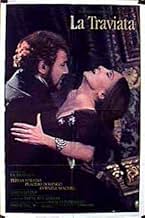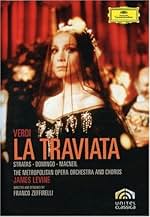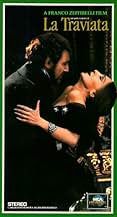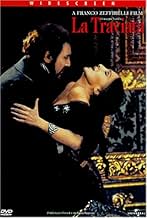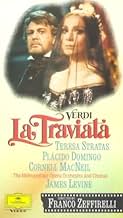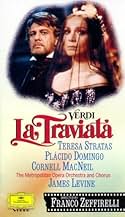AVALIAÇÃO DA IMDb
7,6/10
1,6 mil
SUA AVALIAÇÃO
Retrata o romance entre uma cortesã adoecida e que se encaminha para a morte e um jovem que a amava em segredo e revela seus sentimentos durante uma festa.Retrata o romance entre uma cortesã adoecida e que se encaminha para a morte e um jovem que a amava em segredo e revela seus sentimentos durante uma festa.Retrata o romance entre uma cortesã adoecida e que se encaminha para a morte e um jovem que a amava em segredo e revela seus sentimentos durante uma festa.
- Direção
- Roteiristas
- Artistas
- Indicado a 2 Oscars
- 6 vitórias e 5 indicações no total
Ariel Bybee
- The Voices of
- (canto)
Michael Best
- The Voices of
- (canto)
- Direção
- Roteiristas
- Elenco e equipe completos
- Produção, bilheteria e muito mais no IMDbPro
Avaliações em destaque
A path of education...
Art of high achievement influences many eternally and profoundly. Maybe he was not as accomplished as his good old dad, Alexandra Dumas Fils made his own work a classic household name which is well-remembered and appreciated.
I first heard about "Cha Fa Nui" (Camille) from the mouth of my mother when I was still an upper primary school girl. To a young Chinese girl, this meant nothing at all but I went to the public library and found that there were many copies with this title translated by Taiwanese. I never finished reading it because the names are too long and the Chinese is too literary, I was bored to death by it. The only thing I remembered was that it was a French novel. Dropped, the book, but not the name.
A few years later in the early 80's, Franco Zeffirelli's operatic movie with Chinese title as "Cha Fa Nui" was on show in one and only one movie house, "Palace" at Causeway Bay (demolished!). At that time, this prestigious cinema showed mostly western movies of big names like Gone with the Wind, Casablanca, Dr. Zhivago and so "La Traviata" was one of them.
Hong Kong Chinese were then not very familiar with Western culture, the cinema staff had even misplaced Plácido Domingo's name as "Domingo Plácido" on the billboard. I, as a teenager, was a little intimidated by the movie house by its reputation and grandeur. Yet, out of curiosity, in those fearless, carefree and innocent days, imitating the adults with good taste, I bought a ticket to see this movie. And it was a WOW, what an eye-opening experience!
The vision, the music, the powerful opera singing, the acting and the poetic cinematography, the wondrous costumes and hairdo, it was an educational adventure to a young life. (So, until now I still don't understand how come the man at one row before me could be sleeping and snoring so annoyingly while his girlfriend/wife/sister was staring hard on the screen without moving her head.) Everything is unforgettable about this movie. The happy time of the lovers that Violetta once fell off into a shallow brook from the narrow wood plank. The histrionic and comical fit of Alfredo when he was struggle to open that fateful letter from Violetta. And the most excruciating of all, I can still feel the deafening horror that the deserted and seriously ill Violetta was standing desertedly in the cruelly empty and stripped big house, letting out piercing shriek of pain.
The subsequent episode is an educational search for me: I looked for abridged version of "Cha Fa Nui" in English "Camille" and found out that the names of the original protagonists were Marguerite Gautier and Armand Duval but not those in the operatic adaptation as Violetta Valery and Alfredo Germont. Furthermore, the book inspired Giuseppe Verdi first to make it into an opera but not Franco Zeffirelli's movie.
And five years later, I learned some French and so, dared to touched the original "La Dame aux Camélias". Later, I learnt from an Italian lady that the name of Verdi's opera "La Traviata" was derived from an Italian verb "traviare" which means "to mislead", "to lead astray", or "to corrupt". Thus, a "corrupted man" is a "traviato" and so "the fallen woman" or "the corrupted woman" is "La Traviata". And the book has inspired every generation's film-makers or TV producers, so far there are more than forty adaptations. Well, well, well, what a job all through the years.
What's more interesting, I once read from an oddly-enough page about the Brits' Prince Charles. It is reported that his favourite opera is "La Traviata", and my eyebrows arched. Of course, his loved one is named "Camilla", and strictly speaking by royal standard, she is a "fallen" (committed adultery + divorced) woman.
Art of high achievement influences many eternally and profoundly. Maybe he was not as accomplished as his good old dad, Alexandra Dumas Fils made his own work a classic household name which is well-remembered and appreciated.
I first heard about "Cha Fa Nui" (Camille) from the mouth of my mother when I was still an upper primary school girl. To a young Chinese girl, this meant nothing at all but I went to the public library and found that there were many copies with this title translated by Taiwanese. I never finished reading it because the names are too long and the Chinese is too literary, I was bored to death by it. The only thing I remembered was that it was a French novel. Dropped, the book, but not the name.
A few years later in the early 80's, Franco Zeffirelli's operatic movie with Chinese title as "Cha Fa Nui" was on show in one and only one movie house, "Palace" at Causeway Bay (demolished!). At that time, this prestigious cinema showed mostly western movies of big names like Gone with the Wind, Casablanca, Dr. Zhivago and so "La Traviata" was one of them.
Hong Kong Chinese were then not very familiar with Western culture, the cinema staff had even misplaced Plácido Domingo's name as "Domingo Plácido" on the billboard. I, as a teenager, was a little intimidated by the movie house by its reputation and grandeur. Yet, out of curiosity, in those fearless, carefree and innocent days, imitating the adults with good taste, I bought a ticket to see this movie. And it was a WOW, what an eye-opening experience!
The vision, the music, the powerful opera singing, the acting and the poetic cinematography, the wondrous costumes and hairdo, it was an educational adventure to a young life. (So, until now I still don't understand how come the man at one row before me could be sleeping and snoring so annoyingly while his girlfriend/wife/sister was staring hard on the screen without moving her head.) Everything is unforgettable about this movie. The happy time of the lovers that Violetta once fell off into a shallow brook from the narrow wood plank. The histrionic and comical fit of Alfredo when he was struggle to open that fateful letter from Violetta. And the most excruciating of all, I can still feel the deafening horror that the deserted and seriously ill Violetta was standing desertedly in the cruelly empty and stripped big house, letting out piercing shriek of pain.
The subsequent episode is an educational search for me: I looked for abridged version of "Cha Fa Nui" in English "Camille" and found out that the names of the original protagonists were Marguerite Gautier and Armand Duval but not those in the operatic adaptation as Violetta Valery and Alfredo Germont. Furthermore, the book inspired Giuseppe Verdi first to make it into an opera but not Franco Zeffirelli's movie.
And five years later, I learned some French and so, dared to touched the original "La Dame aux Camélias". Later, I learnt from an Italian lady that the name of Verdi's opera "La Traviata" was derived from an Italian verb "traviare" which means "to mislead", "to lead astray", or "to corrupt". Thus, a "corrupted man" is a "traviato" and so "the fallen woman" or "the corrupted woman" is "La Traviata". And the book has inspired every generation's film-makers or TV producers, so far there are more than forty adaptations. Well, well, well, what a job all through the years.
What's more interesting, I once read from an oddly-enough page about the Brits' Prince Charles. It is reported that his favourite opera is "La Traviata", and my eyebrows arched. Of course, his loved one is named "Camilla", and strictly speaking by royal standard, she is a "fallen" (committed adultery + divorced) woman.
Verdi outdid himself when he penned La Traviata. The cast of singers for this production is superb. The cinematography is appropriately both beautiful and colorful, particularly at the Villa outside Paris.
Stratas is excellent and poignant as Violetta. Domingo makes a most passionate Alfredo. Cornell MacNeil is a splendid Giorgio Germont. Alan Monk is a fine Baron. The cinematography is particularly fine.
All in all this is one of the finest productions of La Traviata ever.
I believe that I have it on both laser disc and DVD.
Stratas is excellent and poignant as Violetta. Domingo makes a most passionate Alfredo. Cornell MacNeil is a splendid Giorgio Germont. Alan Monk is a fine Baron. The cinematography is particularly fine.
All in all this is one of the finest productions of La Traviata ever.
I believe that I have it on both laser disc and DVD.
10hms66
What glorious music! What Glorious singing! A story bigger than life. Production values that do justice to Verdi's opera. This is grand opera at its grandest. In a scale from 1 to 19, this is a 20.
Generally in opera, the singing is the thing. One puts up with elephantine singers, make believe props, bad acting, and other shortcomings to enjoy the music, and especially, the singing. In this film, none of this annoyances takes place. Teresa Stratas looks beautiful as Violeta should. She sings gloriously as Teresa should. Ditto with Placido Domingo. Unlike some opera singers, both of them can act. The sets are sumptuous, the lighting excellent, the cinematography nonpareil. The direction and editing propel the story without flagging for any moment. This film is as close to perfection as humans can achieve.
Generally in opera, the singing is the thing. One puts up with elephantine singers, make believe props, bad acting, and other shortcomings to enjoy the music, and especially, the singing. In this film, none of this annoyances takes place. Teresa Stratas looks beautiful as Violeta should. She sings gloriously as Teresa should. Ditto with Placido Domingo. Unlike some opera singers, both of them can act. The sets are sumptuous, the lighting excellent, the cinematography nonpareil. The direction and editing propel the story without flagging for any moment. This film is as close to perfection as humans can achieve.
Director Franco Zeffirelli brings Guiseppe Verdi's opera gloriously to the screen with a cast that includes Teresa Stratas, Placido Domingo, and Cornell MacNeil, as well as the Metropolitan Opera Orchestra and chorus, in this Oscar-nominated production. This might be a good one to move to next, after Bizet's Carmen, if you are trying to understand the musical form. ---from Musicals on the Silver Screen, American Library Association, 2013
If one considers the love stories of all times, beside the undeniable classics by greatest playwrights, inevitably comes to mind the name of Alexandre Dumas (fils) who, in 1852, wrote a novel THE LADY OF THE CAMELLIAS. Since then, the endless love story set in the 19th century Paris has inspired both opera writers and movie directors. Consequently, the power of the tale embedded in the libretto by Francesco Maria Piave prompted opera maestro Giuseppe Verdi to write one of his most famous operas LA TRAVIATA basing his content entirely on the story about a deathly ill courtesan who, though does not have long to live due to tuberculosis, finds the true love of her life. What came out was a greatly successful work where only characters were renamed but where the audiences were provided with something special and timeless: glorious music.
However, lots of modern viewers skip those classics easily reducing their knowledge to films only. More to say, the commercial nature of cinema hardly promotes any of this high rank entertainment. As a result, the question appears: is it possible to captivate, amaze and enthuse a pop corn generation's viewer with the staff of this sort? The Italian director Franco Zeffirelli managed to prove it possible through this production with some of his personal "additions" and, most importantly, with the magnificent leads: marvelous tenor Placido Domingo and astounding soprano Teresa Stratas. Though LA TRAVIATA has been staged and filmed several times so far, this version occurs to be the best one. Why?
The first aspect that addresses the viewers, both opera buffs and modern genres' lovers, the aspect that highlights the very core of their emotions and experiences, are the visuals of the movie. From the very credits with the view of the Notre Dame Cathedral and the surroundings of the Seine River when the sounds of larks and pigeons mix with the sounds of crows, it all appears to be, as if, a moving work of art that you look at in perfect admiration and astonishment. The wardrobes together with sets and decorations of interiors are stunning to the very essence of visual feast. This effort taken in providing the viewer with vision's awe is magnificently executed throughout. There are plenty of moments one could enumerate praising their pearls and uniqueness but for me, personally, there are two sequences of greatest interest: the lavish party as a flashback of Violetta's delirious mind and her visit to the countryside where the nature seems to praise the sincere love as no one and nothing else. This goes with sublime music by Verdi, which is practically much more memorable for the viewers and their enthusiasm for the entire work of art. Opera is promoted by modern means. Therefore, some of the commentators are right saying "paradoxically" that this is an opera movie for people who hate opera.
Besides, the whole cast fit very well to their roles. This refers both to the lead I have mentioned before as well as to the supporting cast. Placido Domingo as Alfredo Germont and Teresa Stratas as Violetta Valery were a perfect choice for the couple because of their attractiveness and the desirable chemistry. Cornell McNeil is excellent as Giorgio Germont the authoritative parent who, supposedly, cares for his son's future. The three memorably reach the "top notch" performances at the end when emotions are riding to the highest degrees... The supporting male and female roles, including a bunch of beautiful young maidens are easily recognizable and leave a personal impression in viewers.
So to say, LA TRAVIATA is a true work of art, a mysteriously beautiful and subtly exquisite screen work that anyone should see. Referring to the words of Vincent Canby in New York Times who called this film "triumph" and found it "dazzling," I heartily recommend this masterpiece! Perhaps one of the greatest operas of all times and one of the very best productions by Franco Zeffirelli.
However, lots of modern viewers skip those classics easily reducing their knowledge to films only. More to say, the commercial nature of cinema hardly promotes any of this high rank entertainment. As a result, the question appears: is it possible to captivate, amaze and enthuse a pop corn generation's viewer with the staff of this sort? The Italian director Franco Zeffirelli managed to prove it possible through this production with some of his personal "additions" and, most importantly, with the magnificent leads: marvelous tenor Placido Domingo and astounding soprano Teresa Stratas. Though LA TRAVIATA has been staged and filmed several times so far, this version occurs to be the best one. Why?
The first aspect that addresses the viewers, both opera buffs and modern genres' lovers, the aspect that highlights the very core of their emotions and experiences, are the visuals of the movie. From the very credits with the view of the Notre Dame Cathedral and the surroundings of the Seine River when the sounds of larks and pigeons mix with the sounds of crows, it all appears to be, as if, a moving work of art that you look at in perfect admiration and astonishment. The wardrobes together with sets and decorations of interiors are stunning to the very essence of visual feast. This effort taken in providing the viewer with vision's awe is magnificently executed throughout. There are plenty of moments one could enumerate praising their pearls and uniqueness but for me, personally, there are two sequences of greatest interest: the lavish party as a flashback of Violetta's delirious mind and her visit to the countryside where the nature seems to praise the sincere love as no one and nothing else. This goes with sublime music by Verdi, which is practically much more memorable for the viewers and their enthusiasm for the entire work of art. Opera is promoted by modern means. Therefore, some of the commentators are right saying "paradoxically" that this is an opera movie for people who hate opera.
Besides, the whole cast fit very well to their roles. This refers both to the lead I have mentioned before as well as to the supporting cast. Placido Domingo as Alfredo Germont and Teresa Stratas as Violetta Valery were a perfect choice for the couple because of their attractiveness and the desirable chemistry. Cornell McNeil is excellent as Giorgio Germont the authoritative parent who, supposedly, cares for his son's future. The three memorably reach the "top notch" performances at the end when emotions are riding to the highest degrees... The supporting male and female roles, including a bunch of beautiful young maidens are easily recognizable and leave a personal impression in viewers.
So to say, LA TRAVIATA is a true work of art, a mysteriously beautiful and subtly exquisite screen work that anyone should see. Referring to the words of Vincent Canby in New York Times who called this film "triumph" and found it "dazzling," I heartily recommend this masterpiece! Perhaps one of the greatest operas of all times and one of the very best productions by Franco Zeffirelli.
Você sabia?
- CuriosidadesItalian censorship visa # 78579 delivered on 17 February 1983.
- Trilhas sonorasLa Traviata
Written by Giuseppe Verdi
Libretto by Francesco Maria Piave
Performed by the cast of this film and The Metropolitan Opera Orchestra and Chorus
Directed by James Levine
Principais escolhas
Faça login para avaliar e ver a lista de recomendações personalizadas
- How long is La Traviata?Fornecido pela Alexa
Detalhes
Bilheteria
- Faturamento bruto nos EUA e Canadá
- US$ 3.783.329
- Faturamento bruto mundial
- US$ 3.783.329
Contribua para esta página
Sugerir uma alteração ou adicionar conteúdo ausente



